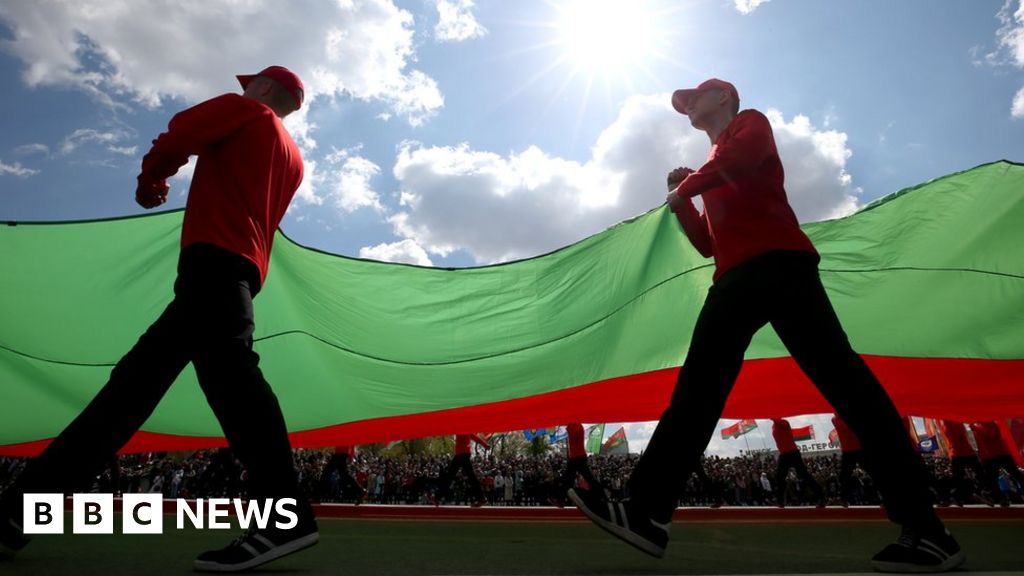Belarus: Five things you may not know about the country - 4 minutes read
 Image copyright Getty Images Image caption Belarus has been in the headlines due to its presidential election
Image copyright Getty Images Image caption Belarus has been in the headlines due to its presidential electionOn Sunday, Belarus President Alexander Lukashenko won a sixth term in office in a disputed election, prompting protesters to take to the streets in cities across the country.
But what else do you know about Belarus?
Here are five things you might be interested to find out about, from the impact of Chernobyl to the Eastern European country's top sports star.
Belarus was the hardest hit country proportionately during World War Two
Image copyright Getty Images Image caption The Nazi occupation in 1941-1944 devastated Belarus
It's thought that the country lost about 25% of its population during World War Two, when Nazi Germany invaded the USSR.
More than 1.6 million civilians and 600,000 Soviet soldiers died in Belarus during the war, including almost the entire Jewish population.
About 85% of the capital Minsk was destroyed in bombing raids and was rebuilt in the 1950s and 60s.
The president is Europe's longest serving ruler
Official results say President Alexander Lukashenko won Sunday's election with more than 80% of the vote.
However, no observers were present, leading to fears of vote-rigging. The main challenger Svetlana Tikhanovskaya has refused to accept the outcome.
Image copyright Reuters Image caption President Alexander Lukashenko has been described as the 'last dictator in Europe'
Mr Lukashenko came to power in 1994.
His tight grip on power has brought criticism from Western nations. The US Bush administration described him in 2005 as the "last dictator in Europe", at the head of an "outpost of tyranny".
Mr Lukashenko once warned that anyone joining an opposition protest would be treated as a "terrorist", adding: "We will wring their necks, as one might a duck."
Human rights groups have accused him of widespread abuses.
Lee Harvey Oswald, who assassinated President Kennedy, lived in Minsk
Image copyright Corbis Image caption Oswald (centre) with fellow factory workers in Minsk
Oswald, a former marine, arrived in the USSR when he was 20, claiming to be a Marxist.
The KGB rejected his application and on the day his tourist visa expired, Oswald slashed one of his wrists. Fearing an international incident, the Soviet authorities let him stay.
He was sent to Minsk and given a job at a radio and TV factory. He lived in a one-bedroom apartment in the city centre.
Oswald was one of Minsk's few foreigners and its only American.
He married Marina Prusakova in March 1961. They had a daughter the following year and moved to the US in 1962.
On 22 November 1963 he shot dead US President John F Kennedy in Dallas, Texas.
About 70% of the radioactive fallout from Chernobyl landed in Belarus
On 26 April 1986, one of four nuclear reactors at the Chernobyl power plant station exploded in Ukraine. It has been described as the world's worst nuclear accident.
A toxic cloud spread across a large swathe of Europe. Neighbouring Belarus suffered the worst of the radioactive fallout - about 70% of the hazardous particles it created landed there.
Image copyright Getty Images Image caption An abandoned cooling tower inside the Chernobyl exclusion zone
One fifth of the country's agricultural land was contaminated and more than 2,000 towns and villages were evacuated. Since 1986, more than half a million people have been relocated.
Some contaminants affecting the soil and the air have a half-life of 24,400 years, according to humanitarian organisation Chernobyl International.
The Chernobyl disaster costs Belarus 20% of its annual national budget, the charity says, and it is estimated that the fallout from the incident will cost the country $235 billion (£179 billion).
Two million people in Belarus, 500,000 of whom are high-risk, live in heavily contaminated zones, according to Chernobyl International.
Victoria Azarenka is the country's most successful tennis player
Image copyright Getty Images Image caption Azarenka is the first Belarusian athlete to take home a medal in Olympic tennis
Victoria Azarenka is the first Belarusian tennis player to reach world number one and the first to take home a medal in Olympic tennis.
She won bronze in the women's singles at the 2012 London Olympics and gold in the mixed doubles. She has also won the Australian Open twice and reached the final of the US Open twice.
Media playback is unsupported on your device Media caption I thought I'd never play tennis again - Azarenka on pregnancy
Azarenka has also competed for Belarus in the Fed Cup, a female all team event.
"My soul is definitely Belarusian and whatever happens and wherever I am, my roots will always be here," she told the Minsk Herald. "I grew up in Belarus and my parents still live here, besides my character was formed here. When I come to Belarus, I come to my home country."
After having her son Leo, she returned to competitive tennis in 2018. She told Tennis.com that she has no intention of slowing down in the near future.
Source: BBC News
Powered by NewsAPI.org